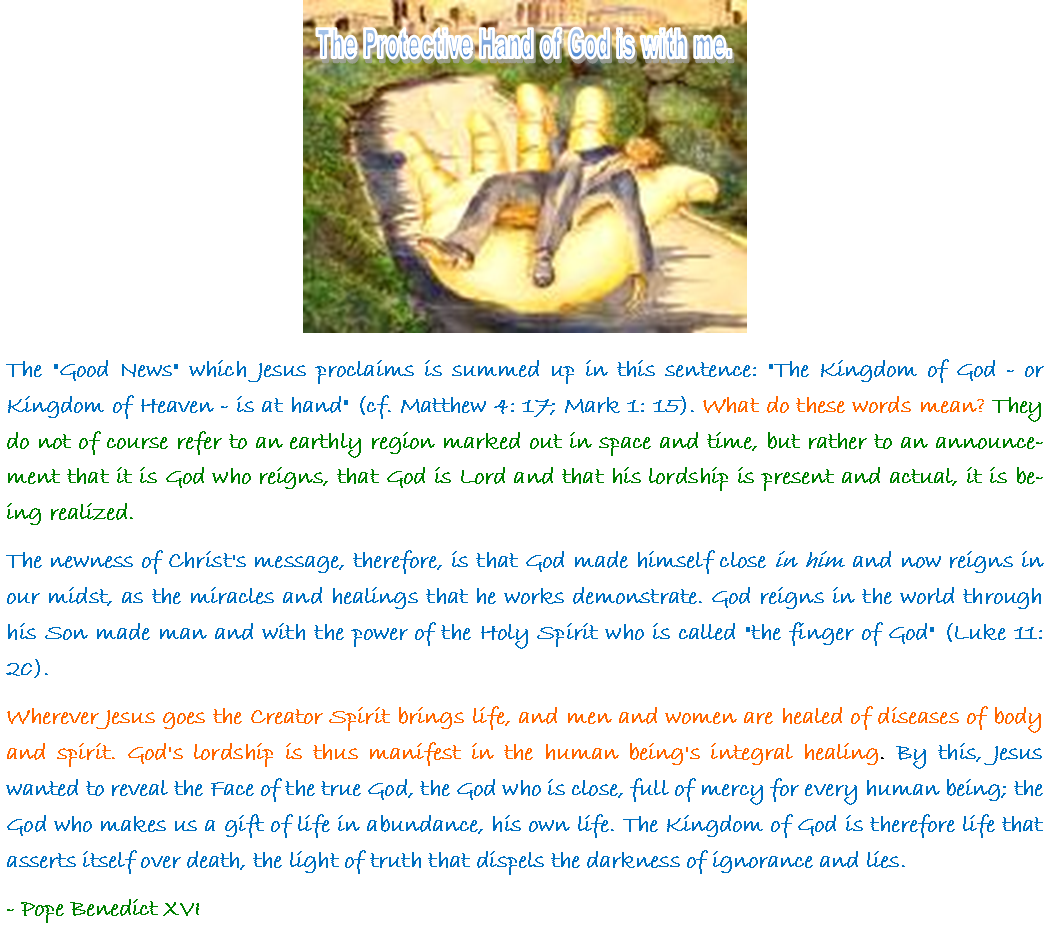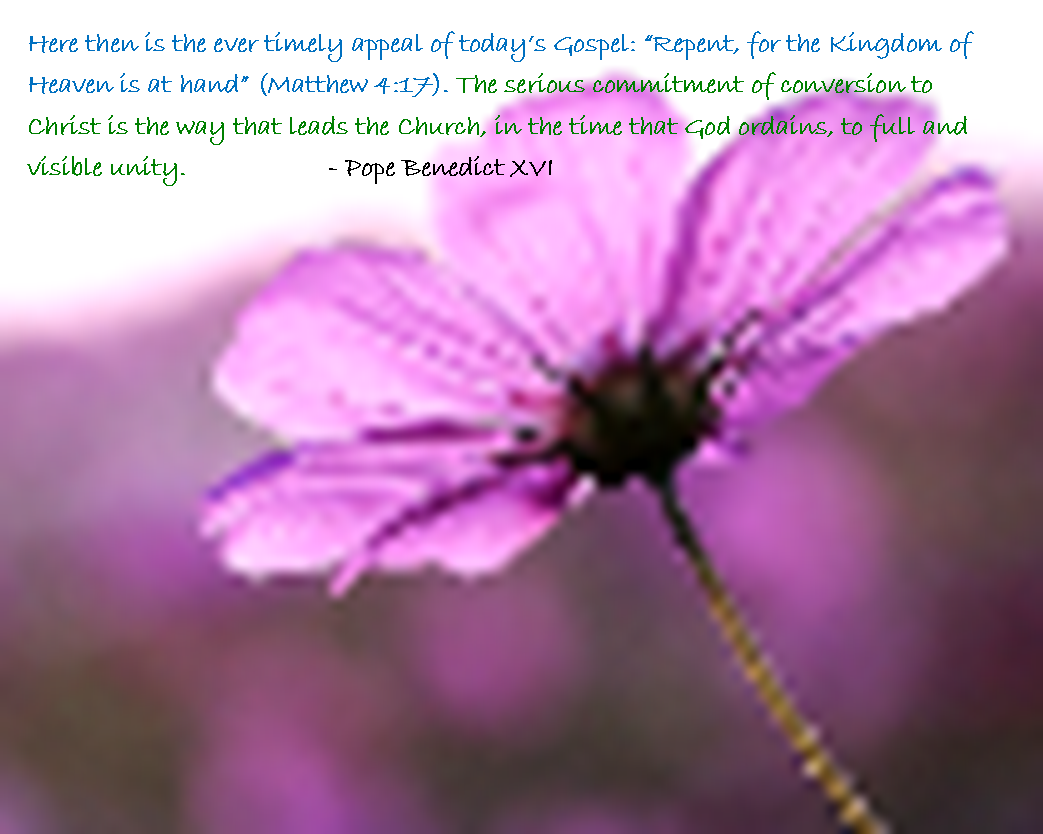|
121 |

|
JOHN PAUL II ANGELUS Sunday, 23 January 2005
1. The "Week of Prayer for Christian Unity" is drawing to a close in these days. As usual, it will be ending with the celebration of Vespers on 25 January in the Basilica of St Paul's-outside-the-Walls. I will join in spirit in this liturgy, in which representatives of the other Churches and Christian Confessions will be taking part and whose principal celebrant will be Cardinal Walter Kasper, President of the Pontifical Council for Promoting Christian Unity.
--------------------------------------------------------------------------------
After the Angelus:
Today in Rome we are celebrating World Day for Catholic Schools on the theme: "Church, family and school: educating together". In order to renew this commitment administrators, teachers, parents and pupils of Catholic schools in Rome have gathered in St Peter's Square, together with those responsible for pastoral work in the Diocese. I offer them my affectionate and grateful greeting, as I express the hope that the precious service they offer Catholic schools will be ever more appreciated and supported by both the ecclesial and civil communities.
I greet the Spanish-speaking pilgrims, especially those from the parishes of La Epifanía, San Francisco Javier y Santa Marta de Valencia, as well as the members of the Dioceses of Avila and Extremadura. Pray for the full communion of Christians! The world is waiting for your Gospel witness of unity! Thank you!
I wish you all a good Sunday.
Acknowledgment: We thank the Vatican Publisher for allowing us to publish the Homilies of Blessed Pope John Paul II, so that it could be accessed by more people all over the world; as a source of God’s encouragements to all of us. |

|
BENEDICT XVI ANGELUS St Peter's Square
Dear Brothers and Sisters,
In today's liturgy the Evangelist Matthew, who will accompany us throughout this liturgical year, presents the beginning of Christ's public mission. It consisted essentially in preaching the Kingdom of God and healing the sick, showing that this Kingdom is close at hand and is already in our midst. Jesus began his preaching in Galilee, the region where he grew up, the "outskirts" in comparison with the heart of the Jewish Nation which was Judea, and in it, Jerusalem. But the Prophet Isaiah had foretold that this land, assigned to the tribes of Zebulun and Napthali, would have a glorious future: the people immersed in darkness would see a great light (cf. Isaiah 8: 23-9: 2). In Jesus' time, the term "gospel" was used by Roman emperors for their proclamations. Independently of their content, they were described as "good news" or announcements of salvation, because the emperor was considered lord of the world and his every edict as a portent of good. Thus, the application of this phrase to Jesus' preaching had a strongly critical meaning, as if to say God, and not the emperor, is Lord of the world, and the true Gospel is that of Jesus Christ.
The "Good News" which Jesus proclaims is summed up in this sentence: "The Kingdom of God - or Kingdom of Heaven - is at hand" (cf. Matthew 4: 17; Mark 1: 15). What do these words mean? They do not of course refer to an earthly region marked out in space and time, but rather to an announcement that it is God who reigns, that God is Lord and that his lordship is present and actual, it is being realized. The newness of Christ's message, therefore, is that God made himself close in him and now reigns in our midst, as the miracles and healings that he works demonstrate. God reigns in the world through his Son made man and with the power of the Holy Spirit who is called "the finger of God" (Luke 11: 20). Wherever Jesus goes the Creator Spirit brings life, and men and women are healed of diseases of body and spirit. God's lordship is thus manifest in the human being's integral healing. By this, Jesus wanted to reveal the Face of the true God, the God who is close, full of mercy for every human being; the God who makes us a gift of life in abundance, his own life. The Kingdom of God is therefore life that asserts itself over death, the light of truth that dispels the darkness of ignorance and lies.
Let us pray to Mary Most Holy that she will always obtain for the Church the same passion for God's Kingdom which enlivened the mission of Jesus Christ: a passion for God, for his lordship of love and life; a passion for man, encountered in truth with the desire to give him the most precious treasure: the love of God, his Creator and Father.
-------------------------------------------------------------------------------------
After the Angelus:
I greet with great affection the children and boys and girls of Rome's Catholic Action who come every year at the end of the "Month of Peace", accompanied by the Cardinal Vicar and their parents and teachers. Two of them are here beside me, they have presented a message to me which we have heard, and in a moment they will help me launch into flight two doves, symbols of peace. Dear little friends, I know you work for your peers who are suffering because of war and poverty. Continue on the path Jesus has pointed out to us to build true peace! We want all together to help the world's poor children. We are always working for peace, not only today or in this month, but always. The Lord will help and accompany us.
Today, we are celebrating the World Day for Those Afflicted by Leprosy, initiated 55 years ago by Raoul Follereau. I address my affectionate greeting to all sufferers of this disease and assure them of a special prayer which I extend to everyone who works beside them, and in particular to the volunteers of the Friends of the Raoul Follereau Association.
I greet all the English-speaking visitors present at today’s Angelus. In this Sunday’s Gospel, we hear how Jesus called his first apostles. At once they left everything and followed him. We too are called to be disciples of Jesus. Let us be ready to offer ourselves generously and whole-heartedly in his service. Upon all of you here today, and upon your families and loved ones at home, I invoke God’s abundant blessings.
I wish you all a good Sunday; and now let us set free the doves of peace brought by the children of Rome. |

|
BENEDICT XVI ANGELUS St Peter's Square (Video)
Dear Brothers and Sisters,
The Week of Prayer for Christian Unity is being held in these days, from 18 to 25 January. This year its theme is a passage from the Book of the Acts of the Apostles that sums up in a few words the life of the first Christian community of Jerusalem: “And they devoted themselves to the apostles' teaching and fellowship, to the breaking of bread and the prayers” (Acts 2:42). It is very significant that this theme was suggested by the Churches and Christian Communities of Jerusalem, reunited in an ecumenical spirit.
We know how many trials our brothers and sisters of the Holy Land and of the Middle East must face. Their service is therefore all the more precious, strengthened by a witness which in some cases has even gone so far as the sacrifice of their life. Therefore, as we joyfully welcome the ideas offered for reflection by the Communities that live in Jerusalem, we gather round them and this becomes a further factor of communion for all.
Today too, if we Christians are to be in the world a sign and instrument of close union with God and of unity among men we must found our life on these four “hinges”: a life founded on the faith of the Apostles passed on through the living Tradition of the Church, brotherly communion, the Eucharist and prayer. Only in this way, by remaining firmly united to Christ, can the Church carry out her mission effectively, despite the limitations and shortcomings of her members, despite the divisions which the Apostle Paul already had to face in the community of Corinth as the Second Reading from the Bible this Sunday recalls, where he says: “I appeal to you, brethren, by the name of our Lord Jesus Christ, that all of you agree and that there be no dissensions among you, but that you be united in the same mind and the same judgement” (1 Corinthians 1:10). In fact, the Apostle knew that in the Christian community of Corinth discord and divisions had developed; therefore, with great firmness he added: “Is Christ divided?” (1:13). By so saying he affirmed that every division in the Church is an offence to Christ; and, at the same time, that it is always in him — the one Head and Lord — that we can find ourselves once again united, through the inexhaustible power of his grace.
Here then is the ever timely appeal of today’s Gospel: “Repent, for the Kingdom of Heaven is at hand” (Matthew 4:17). The serious commitment of conversion to Christ is the way that leads the Church, in the time that God ordains, to full and visible unity. A number of ecumenical meetings in these days which are increasing everywhere in the world is a sign of this. As well as the presence of various ecumenical Delegations here in Rome, a meeting session of the Commission for Theological Dialogue between the Catholic Church and the Oriental Orthodox Churches of the East will begin tomorrow. And the day after tomorrow we shall conclude the Week of Prayer for Christian Unity with the solemn celebration of Vespers on the Feast of the Conversion of St Paul. May the Virgin Mary, Mother of the Church always go with us on this journey.
--------------------------------------------------------------------------------
After the Angelus:
I am pleased to greet the English-speaking pilgrims present at this Angelus prayer. In the Liturgy today, we hear of the generous response of the first disciples to the call of Christ. May each of us continually recognize the call of the Lord in our own lives and engage in the work of evangelization without fear or reluctance. Entrusting you to the care of Mary, Mother of the Church, I invoke upon you and your families God’s abundant blessings.
I wish everyone a good Sunday and a good week!
Acknowledgment: We thank the Vatican Publisher for allowing us to publish the Homilies of Pope Benedict XVI, so that it could be accessed by more people all over the world; as a source of God’s encouragements to all of us.
2 February 2014 |